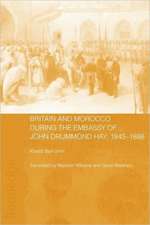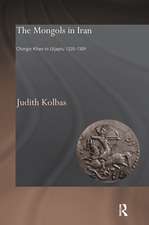The Archaeology of Sacred Spaces: The temple in western India, 2nd century BCE–8th century CE: Archaeology and Religion in South Asia
Autor Susan Verma Mishra, Himanshu Prabha Rayen Limba Engleză Paperback – 25 apr 2019
| Toate formatele și edițiile | Preț | Express |
|---|---|---|
| Paperback (1) | 416.22 lei 43-57 zile | |
| Taylor & Francis – 25 apr 2019 | 416.22 lei 43-57 zile | |
| Hardback (1) | 1055.51 lei 43-57 zile | |
| Taylor & Francis – 16 aug 2016 | 1055.51 lei 43-57 zile |
Din seria Archaeology and Religion in South Asia
-
 Preț: 312.36 lei
Preț: 312.36 lei -
 Preț: 449.41 lei
Preț: 449.41 lei -
 Preț: 436.14 lei
Preț: 436.14 lei -
 Preț: 436.14 lei
Preț: 436.14 lei -
 Preț: 400.18 lei
Preț: 400.18 lei -
 Preț: 389.11 lei
Preț: 389.11 lei -
 Preț: 389.38 lei
Preț: 389.38 lei - 15%
 Preț: 259.33 lei
Preț: 259.33 lei
Preț: 416.22 lei
Nou
Puncte Express: 624
Preț estimativ în valută:
79.64€ • 83.36$ • 66.29£
79.64€ • 83.36$ • 66.29£
Carte tipărită la comandă
Livrare economică 31 martie-14 aprilie
Preluare comenzi: 021 569.72.76
Specificații
ISBN-13: 9780367177300
ISBN-10: 0367177307
Pagini: 296
Dimensiuni: 138 x 216 x 16 mm
Greutate: 0.45 kg
Ediția:1
Editura: Taylor & Francis
Colecția Routledge
Seria Archaeology and Religion in South Asia
Locul publicării:Oxford, United Kingdom
ISBN-10: 0367177307
Pagini: 296
Dimensiuni: 138 x 216 x 16 mm
Greutate: 0.45 kg
Ediția:1
Editura: Taylor & Francis
Colecția Routledge
Seria Archaeology and Religion in South Asia
Locul publicării:Oxford, United Kingdom
Public țintă
PostgraduateCuprins
Tables and Figures. Preface. Introduction I. Monumental Remains: Defining Sacred Space II. Sacred Sites and Settlement Sites III. Religious Icons in Gujarat IV. Shared Space and Multiple Affiliations V. Religious Processes, Rituals and Pilgrimage VI. Gujarat in Context Bibliography. Index
Notă biografică
Susan Verma Mishra is Project Associate, Indira Gandhi National Centre for the Arts (IGNCA), New Delhi, India.
Himanshu Prabha Ray is Chairperson, Academic Committee, Project Mausam, Indira Gandhi National Centre for the Arts, New Delhi, India. She is Honorary Professor, Distant Worlds, Munich Graduate School of Ancient Studies, Ludwig Maximilian University, Munich, Germany, and Research Fellow, Oxford Centre for Hindu Studies, Oxford, UK.
Himanshu Prabha Ray is Chairperson, Academic Committee, Project Mausam, Indira Gandhi National Centre for the Arts, New Delhi, India. She is Honorary Professor, Distant Worlds, Munich Graduate School of Ancient Studies, Ludwig Maximilian University, Munich, Germany, and Research Fellow, Oxford Centre for Hindu Studies, Oxford, UK.
Descriere
This volume focuses on the religious shrine in western India as an institution of cultural integration in the period spanning 200 BCE to 800 CE. It presents an analysis of religious architecture at multiple levels, both temporal and spatial, and distinguishes it as a ritual instrument that integrates individuals and communities into a cultural fabric. The work shows how these structures emphasise on communication with a host of audiences such as the lay worshipper, the ritual specialist, the royalty and the elite as well as the artisan and the sculptor. It also examines religious imagery, inscriptions, traditional lore and Sanskrit literature. The book will be of special interest to researchers and scholars of ancient Indian history, Hinduism, religious studies, architecture and South Asian studies.















